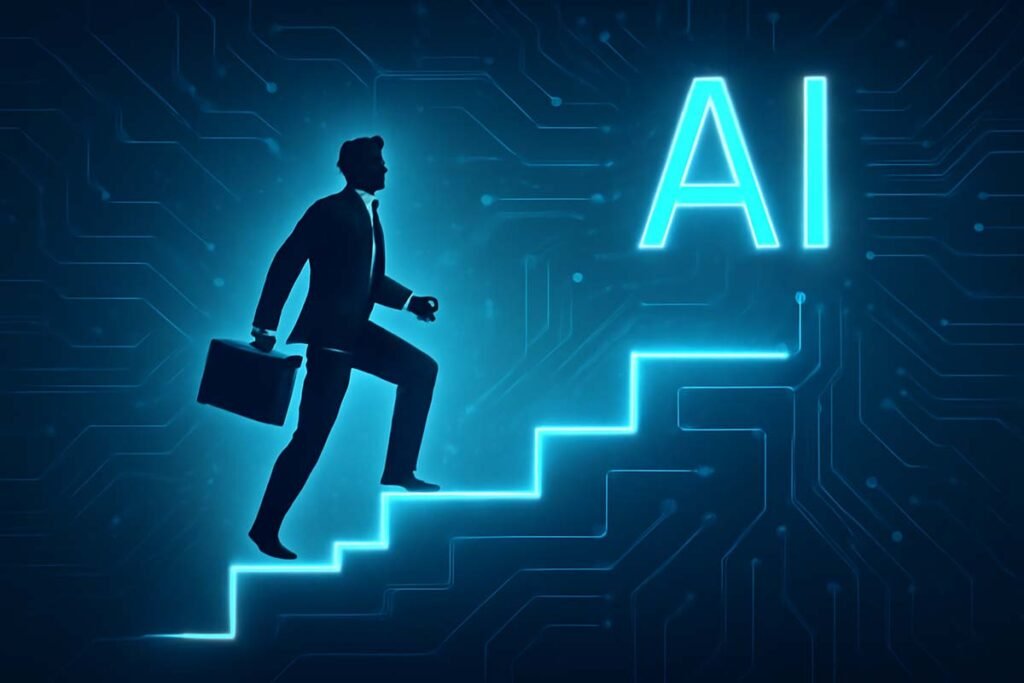Artificial Intelligence (AI) is one of the fastest-growing and highest-paying industries in 2025. From generative AI tools like ChatGPT to self-driving cars, demand for AI professionals is skyrocketing — and it’s not limited to programmers. Designers, marketers, analysts, and even non-tech professionals can now enter this booming field with the right skills.
Whether you’re a student, a working professional looking to switch careers, or an entrepreneur, this step-by-step guide will walk you through how to start a career in AI and land high-paying opportunities in 2025.
1. Understand What AI Is and Where It’s Used
Before jumping in, get a clear understanding of AI and its applications.
Common AI Applications in 2025:
- Natural Language Processing (NLP): Chatbots, language translation, sentiment analysis.
- Computer Vision: Image recognition, security systems, medical imaging.
- Machine Learning (ML): Predictive analytics, recommendation systems.
- Robotics: Manufacturing automation, delivery drones.
- Generative AI: Text, image, video, and music creation.
💡 Tip: Spend your first 1–2 weeks just exploring AI use cases through articles, free YouTube tutorials, and podcasts to see what interests you most.
2. Choose Your AI Career Path
AI is a vast field with multiple career paths. Select one based on your skills and goals.
Popular AI Career Roles in 2025:
- AI/ML Engineer – Builds and trains AI models. (Requires strong programming skills)
- Data Scientist – Works with large datasets to create insights and models.
- AI Product Manager – Oversees development of AI-powered products.
- AI Prompt Engineer – Specializes in crafting inputs for generative AI tools.
- AI Consultant – Helps businesses implement AI solutions.
- Research Scientist – Works on cutting-edge AI theory and improvement.
- AI Ethics Specialist – Ensures AI is used fairly and responsibly.
💡 Pro Tip: If you’re not from a tech background, roles like AI Prompt Engineer or AI Consultant are easier entry points.
3. Learn the Core Skills
Regardless of your chosen path, certain foundational skills will help you thrive:
Technical Skills:
- Programming: Python is the most popular language.
- Mathematics: Linear algebra, probability, and statistics.
- Machine Learning Basics: Supervised & unsupervised learning.
- Data Handling: SQL, Pandas, NumPy.
Non-Technical Skills:
- Critical thinking
- Problem-solving
- Communication & storytelling with data
💡 Resource Tip: FreeCodeCamp, Coursera, and edX offer beginner-friendly AI courses.
4. Build a Learning Plan
To avoid information overload, follow a structured plan:
Phase 1 – Foundations (1–2 months)
- Learn Python basics
- Understand AI concepts and terminology
- Study math basics for AI
Phase 2 – Core AI Skills (3–4 months)
- Beginner ML algorithms
- Data cleaning and analysis
- Introduction to deep learning
Phase 3 – Specialization (2–3 months)
- Pick one niche like NLP, computer vision, or generative AI
- Complete a specialized course
5. Work on Real Projects
Nothing boosts your resume like hands-on AI projects.
Project Ideas:
- Chatbot for customer support
- AI-based product recommendation system
- Image classifier for a niche product
- Sentiment analysis for Twitter reviews
💡 Host your projects on GitHub so potential employers can see your work.
6. Create a Strong AI Portfolio
A portfolio should include:
- 3–5 projects with descriptions and outcomes
- Links to live demos (if applicable)
- GitHub repository
- Blog posts explaining your work (Great for building authority!)
7. Network in the AI Community
AI networking can open job doors faster than cold applications.
Where to Network:
- LinkedIn AI groups
- Twitter/X AI influencers
- AI meetups & hackathons
- Online communities like Kaggle & Reddit AI threads
💡 Pro Tip: Share your AI projects on LinkedIn with a detailed post — recruiters actively search there.
8. Apply for Internships or Entry-Level Roles
Don’t hesitate to apply for roles even if you don’t meet all requirements. Internships, freelance projects, and junior AI roles can accelerate your career.
Job boards to check:
- LinkedIn Jobs
- Indeed
- AngelList (for AI startups)
- AI-specific boards like ai-jobs.net
9. Stay Updated
AI evolves quickly. Spend at least 30 minutes a day reading AI news or exploring new tools.
Best Sources in 2025:
- AI newsletters like Import AI & The Algorithm
- YouTube channels (Two Minute Papers, Tech With Tim)
- OpenAI and Google AI blogs
10. Monetize Your AI Skills
AI careers aren’t limited to jobs — you can freelance, consult, or even start your own business.
AI Monetization Ideas:
- Freelancing on Upwork & Fiverr
- Creating and selling AI prompts
- Launching AI-powered digital products
- Teaching AI basics via online courses
Starting a career in AI in 2025 is one of the smartest career moves you can make. With an average starting salary between $60,000–$90,000/year for beginners in many markets (and much higher in the US and Europe), endless opportunities in almost every industry, and room for creativity, AI is here to transform the job market.
But the key is consistent learning + real-world projects. Pick your path, build your skills, showcase your work, and start networking — the AI job you want is closer than you think.




Pingback: Beginner’s Guide to Prompt Engineering – Mastering AI Communication in 2025 - firstspost.com
Pingback: AI in Everyday Life – 15 Real Examples You’re Already Using (2025) - firstspost.com
Pingback: Top 10 AI Tools for Small Businesses in 2025: Save Time & Grow Smarter - firstspost.com
Pingback: Top Free AI Tools for Students in 2025: Boost Learning & Productivity - firstspost.com
Pingback: AI Jobs You Can Do Without Coding in 2025 – High Demand & High Pay - firstspost.com
Pingback: Best AI Communities & Forums to Learn and Grow (2025) - firstspost.com
Pingback: Beginner’s Guide to Artificial Intelligence 2025 – What is AI, Examples & Uses - firstspost.com